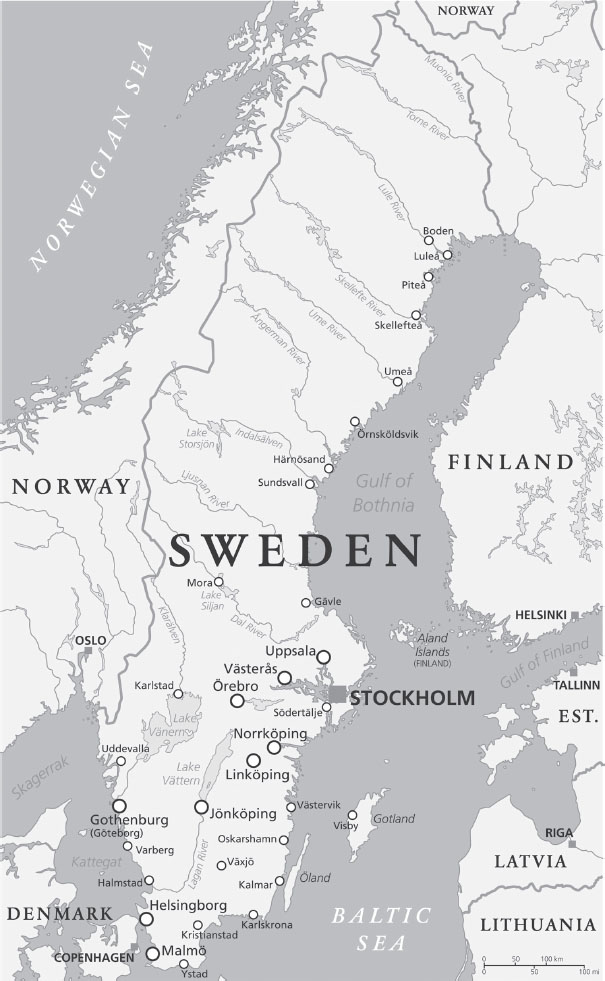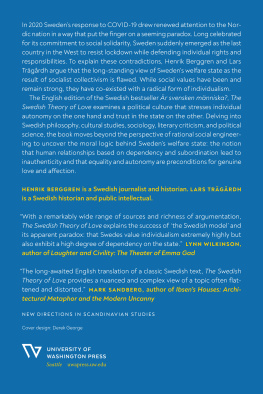Contents
Pagebreaks of the print version
ALMOST
PERFEKT
British freelance journalist David Crouch moved to Sweden in 2013, settling in Gothenburg on the west coast. Previously, he was a news editor at the Financial Times in London. Now reporting mainly for the Guardian, he also teaches investigative journalism at Gothenburg University. In a previous life, he acquired a D.Phil. in sociology. In another previous life, he was a translator and editor in Moscow.
ALMOST
PERFEKT
How Sweden Works and What We Can Learn From It
David Crouch

Published by Blink Publishing
2.25, The Plaza,
535 Kings Road,
Chelsea Harbour,
London, SW10 0SZ
www.blinkpublishing.co.uk
facebook.com/blinkpublishing
twitter.com/blinkpublishing
Trade paperback 9781788701563
Ebook 9781788701556
All rights reserved. No part of the publication may be reproduced, stored in a retrieval system, transmitted or circulated in any form or by any means, electronic, mechanical, photocopying, recording or otherwise, without prior permission in writing of the publisher.
A CIP catalogue of this book is available from the British Library.
Typeset by seagulls.net
Copyright David Crouch, 2018
Under license from the Karl-Adam Bonnier Foundation.
First published by KABS Karl-Adam Bonniers Stiftelse in 2018 as Bumblebee Nation: The Hidden Story of the New Swedish Model.
This edition first published by Blink Publishing in 2019
Map on p.xi Shutterstock
David Crouch has asserted his moral right to be identified as the author of this Work in accordance with the Copyright, Designs and Patents Act 1988.
Every reasonable effort has been made to trace copyright holders of material reproduced in this book, but if any have been inadvertently overlooked the publishers would be glad to hear from them.
Blink Publishing is an imprint of Bonnier Books UK
www.bonnierbooks.co.uk
To Annika
Contents

In the late summer of 2015, I started a rumour that went around the world and reinforced the prejudices about Scandinavia held by tens of millions of people.
It began with the best of intentions. I was still new to Sweden, where I had followed my wife-to-be and started a new life as a freelance reporter after some comfortable desk jobs in the London media. Now I believed I had discovered a good story, so on a sunny August morning I set off to investigate.
My friend Daniel, a photojournalist and outdoors enthusiast, picked me up in his red Volvo estate, normally full of mountain bikes, surfboards or rock-climbing equipment. We drove across the lvsborg suspension bridge at the mouth of the Gta river as the sun shone on its playful, eggshell green girders. Towards the horizon, a line of vast wind turbines revolved slowly, perched among dark knuckles of rock where the granite coast crumbles into the sea. This was Gothenburg, Swedens second city and now my home.
We pulled up on a leafy cul-de-sac among the tall birches that surround Svartedalen retirement home, a red brick block in an area better known for its poverty and gang violence. I got out my notepad and Daniel his camera. This unlikely setting was an experiment in the future of work. For the past six months, the elderly care nurses had been working a six-hour day, instead of the usual eight, for the same wage.
Since the 1990s, Svartedalen had been facing more work with fewer and fewer staff. We cant do it any more, Ann-Charlotte Dahlbom Larsson, who ran the home, told us. There is a lot of illness and depression among staff in the care sector because of exhaustion, the lack of balance between work and life is not good for anyone. Already, she said, on the six-hour day staff were feeling noticeably better, but the standard of care had also improved. The new arrangement was likely to be more expensive the home had hired extra nurses to cover the gaps left by the shorter working hours.
Lise-Lotte Pettersson, an assistant nurse, showed us around, taking a moment along the way to dance tenderly with an elderly man. Caring for the residents, some of whom had dementia, demanded constant vigilance and creativity, and with a six-hour day Lise-Lotte could sustain a higher standard of care, she said: I used to be exhausted all the time, I would come home from work and pass out on the sofa. But not now. I am much more alert: I have much more energy for my work, and also for family life.
I first learned about this experiment from a political flyer stuck to the wall of a tram stop near our flat. The country was preparing for an election, and with the help of Google Translate I was trying to understand what was going on. A bleak and soulless street corner opposite the cemetery, with its injunction to Think about Death inscribed over the gates, seemed like a dismal place for a declaration about the future of humanity. But there it was: something called the Left Party, whoever they were, wanted a six-hour working day. I wanted to be on a beach in the Bahamas, but there was about an equal chance of either of those things happening, I thought. And I got on the tram.
But somehow, here in this wet and windy city on the northern edge of the planet, the idea found a hearing. Gothenburg city council, run by the centre-left Social Democrats who have dominated Swedish politics since the 1930s, agreed to a small experiment at the nursing home. Meanwhile, on the other side of the city, a Toyota servicing centre had moved to a six-hour day more than a decade before, leading to lower staff turnover, more efficient use of the machines and lower capital costs. I trawled the web and found a couple of small businesses that were also using a shorter working day and bingo! I had a story.
Sweden itself was about to turn into a much more urgent international story, as the country opened its doors during the coming months to 163,000 refugees from the wars in Asia, Africa and the Middle East. But as for my little story about shorter working hours, the genie was out of the bottle. It turned out that my feature about Lise-Lotte and some Toyota mechanics appealed to every prejudice that we hold about Sweden, the land of Abba and IKEA, of blonde hair and blue eyes, of sex and socialism and Scandi silliness. Scotland was the first to take notice. The Herald wrote:
What have these wacky Scandinavians been up to now? I will tell you what: experimenting with a six-hour working day, thats what. A typical Britisher will think: Six-hour working day? Thats immoral. First, it was pornography. Now this. The Scandinavians need reining in. We cannot believe everything they do in Scandinavia is good and everything we do is bad, despite all the evidence. But its nice to have a beacon of hope, however illusory. And the thought that somebody somewhere is trying to organise society on sane lines gives us courage to carry on in Barmy Britannia.
During the Cold War, the idea that things could be different, that society could be organised along alternative lines, was often connected to Russia. But after the Soviet monolith collapsed and Putin reigned over a regime of ruthless oligarchs, we were left with Sweden. My story spread like wildfire, to Ireland across Britain, and the US.















